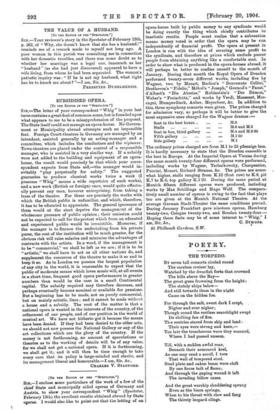[To THE EDITOR OP THE "SPECTATOR. "]
SIB,—The letter of your correspondent " Whig " in your last issue contains a great deal of common-sense, but is founded upon what appears to me to be a misapprehension of the proposal. The State itself could not manage an opera-house. No Govern- ment or Municipality abroad attempts such an impossible feat. Foreign Court-theatres in Germany are managed by an intendant, assisted generally by an acting-manager and a committee, which includes the conductors and the regisseur. Town-theatres are placed under the control of a responsible manager, who is assisted in a very similar way. If a subsidy were not added to the building and equipment of an opera- house, the result would precisely be that which your corre- spondent expects from State aid,—the manager would in- evitably "play perpetually for safety." The suggested guarantee to produce classical works twice a week (I presume " Whig " means a wide repertoire of such works), and a new work (British or foreign) once, would quite effectu- ally prevent any man, however enterprising, from taking a lease of the theatre. For these are precisely the works with which the British public is unfamiliar, and which, therefore, it has to be educated to appreciate. The general ignorance of them would at the start deprive the management of the wholesome pressure of public opinion ; their omission could not be expected to call for the protest which from an educated and experienced public would be irresistible. Moreover, if the manager is to finance the undertaking from his private purse, the cost of the institution will be much greater, for the obvious risk will raise salaries and minimise the advantages of contracts with the artists. In a word, if the management is to be " commercial," we shall be left as we are ; if it is to be " artistic," we shall have to act as all other nations do, and supplement the resources of the theatre to make it so and to keep it so. As in London we possess the largest population of any city in the world, it is reasonable to expect that the public of moderate means which loves music will, at all events in a short time, frequent good opera performances in greater numbers than would be the case in a small Continental capital. The subsidy required may therefore decrease, and perhaps eventually become nominal or available for pensions. But a beginning has to be made, not on purely commercial, but on mainly artistic, lines ; and it cannot be made without a house and a subsidy. The root of the matter is that a national opera is wanted in the interests of the country, of the refinement of our people, and of our position in the world of musical art. We have not hitherto got it because the means have been denied. If they had been denied to the other arts, we should not now possess the National Gallery or any of the art collections which are the glory of the country. If the money is not forthcoming, no amount of speculations or theories as to the working of details will be of any value, for we shall not get a national opera. If it is forthcoming, we shall get it; and it will then be time enough to take every care that its policy is large-minded and elastic, and its management liberal and honourable.—I am, Sir, &c., CHARLES V. STANFORD.










































 Previous page
Previous page